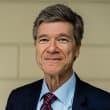Explore how religious and philosophical traditions inform ethical approaches to global challenges and sustainable development.
Explore how religious and philosophical traditions inform ethical approaches to global challenges and sustainable development.
This comprehensive course examines the intersection of ethics, religion, and sustainable development through the lens of virtue ethics. Based on the Ethics in Action initiative at the Vatican, it brings together perspectives from major religious traditions, philosophers, and scientists to address global challenges. Students explore how different faiths and philosophical traditions approach ethical conduct, examining common virtues across cultures and their application to issues like poverty, climate change, and peace. The course emphasizes the crucial role of multi-faith cooperation in achieving sustainable development goals.
4.4
(5 ratings)
11,675 already enrolled
Instructors:
English
English, Spanish, Russian
What you'll learn
Understand virtue ethics and its expression in major religious traditions
Examine the role of multi-faith consensus in sustainable development
Analyze how ethics motivates various stakeholders in development work
Explore religious perspectives on contemporary global challenges
Develop framework for shared virtue ethics in sustainable development
Understand the connection between spiritual values and social change
Skills you'll gain
This course includes:
PreRecorded video
Graded assignments, exams
Access on Mobile, Tablet, Desktop
Limited Access access
Shareable certificate
Closed caption
Get a Completion Certificate
Share your certificate with prospective employers and your professional network on LinkedIn.
Created by
Provided by

Top companies offer this course to their employees
Top companies provide this course to enhance their employees' skills, ensuring they excel in handling complex projects and drive organizational success.





There are 10 modules in this course
This course explores the moral dimensions of sustainable development through the lens of religious and philosophical traditions. Students examine virtue ethics across different faiths and cultures, investigating how ethical principles can address global challenges. The curriculum covers key topics including poverty, peace, environmental justice, and business ethics, while emphasizing the importance of multi-faith cooperation. Special attention is given to practical applications through case studies and real-world examples of ethical action in sustainable development.
Introduction to Ethics in Action
Module 1
Religion and Virtue Ethics - Part I
Module 2
Religion and Virtue Ethics - Part II
Module 3
The Virtuous Society
Module 4
Poverty and Inequality
Module 5
Peace
Module 6
Refugees, Trafficking, and Modern Slavery
Module 7
Environmental Justice
Module 8
Politics and Power
Module 9
Business, Work, and the Common Good
Module 10
Fee Structure
Instructors

19 Courses
Sustainable Development and Economic Policy Pioneer
Jeffrey D. Sachs stands as one of the world's most influential economists and sustainable development experts, currently serving as University Professor at Columbia University and Director of the Center for Sustainable Development. His academic journey began at Harvard University, where he earned his B.A., M.A., and Ph.D. degrees, and later served as the Galen L. Stone Professor of International Trade for over twenty years. Throughout his career, Sachs has shaped global policy as Special Advisor to three UN Secretaries-General, advising on both the Millennium Development Goals and Sustainable Development Goals. His expertise spans economic development, global macroeconomics, and poverty alleviation, having worked in more than 125 countries. As Director of the UN Sustainable Development Solutions Network and President of SDG USA, he continues to drive sustainable development initiatives worldwide. His influential works include bestsellers such as "The End of Poverty," "Common Wealth: Economics for a Crowded Planet," and "The Age of Sustainable Development." His achievements have earned him numerous accolades, including the 2015 Blue Planet Prize and the 2022 Tang Prize in Sustainable Development, while Time Magazine has twice named him among the world's 100 most influential leaders. Beyond his academic work, he serves as a Commissioner of the ITU/UNESCO Broadband Commission for Development and maintains active engagement with the Pontifical Academy of Sciences and Social Sciences on sustainable development issues.

2 Courses
Pioneering Interfaith Leader Advancing Global Peace Through Religious Cooperation
Dr. William F. Vendley has dedicated his career to fostering interfaith dialogue and peace-building as Secretary General of Religions for Peace International from 1994 to 2019, where he coordinated activities across 90 national and 5 regional councils. His academic journey includes a BS from Purdue University, MA from Maryknoll School of Theology, and Ph.D. in Systematic Theology from Fordham University, complemented by studies in Buddhism in Sri Lanka and Zen meditation practice in Japan. Under his leadership, he pioneered numerous peace initiatives, including establishing the Inter-religious Council of Bosnia-Herzegovina after the civil war and the Hope for African Children Initiative, which raised over $50 million to support communities affected by HIV/AIDS. His expertise spans theological education, where he served as Dean at Catholic Major Seminary and professor at Maryknoll School of Theology, to international diplomacy, serving as advisor to President Obama's Faith-Based Council and the US State Department. Currently serving as Senior Advisor at the Fetzer Institute and Secretary General Emeritus of Religions for Peace, he continues to advance personal and social transformation through interfaith cooperation. His work has been marked by concrete achievements in conflict resolution, from Sierra Leone to Iraq, while fostering multi-religious collaboration to address global challenges including poverty, climate change, and social justice.
Testimonials
Testimonials and success stories are a testament to the quality of this program and its impact on your career and learning journey. Be the first to help others make an informed decision by sharing your review of the course.
4.4 course rating
5 ratings
Frequently asked questions
Below are some of the most commonly asked questions about this course. We aim to provide clear and concise answers to help you better understand the course content, structure, and any other relevant information. If you have any additional questions or if your question is not listed here, please don't hesitate to reach out to our support team for further assistance.



